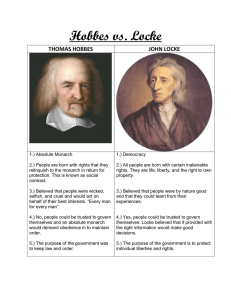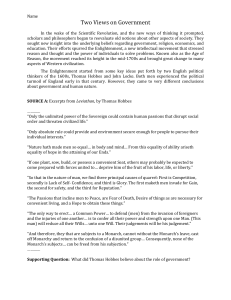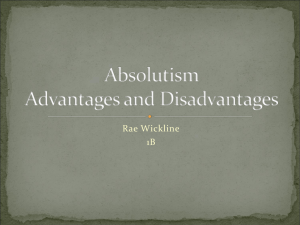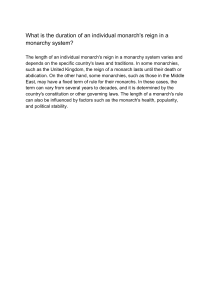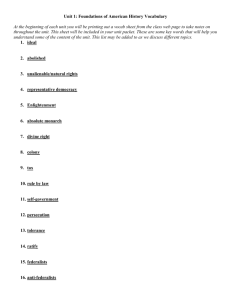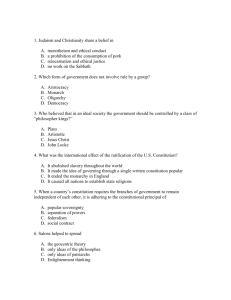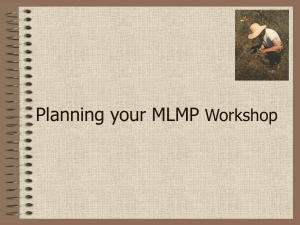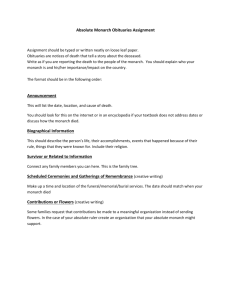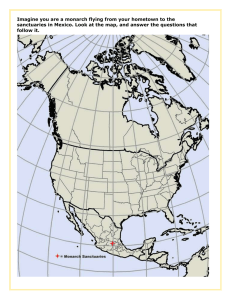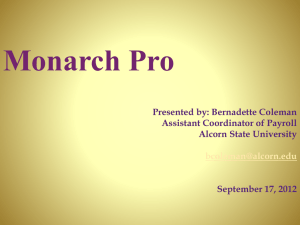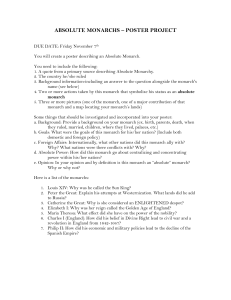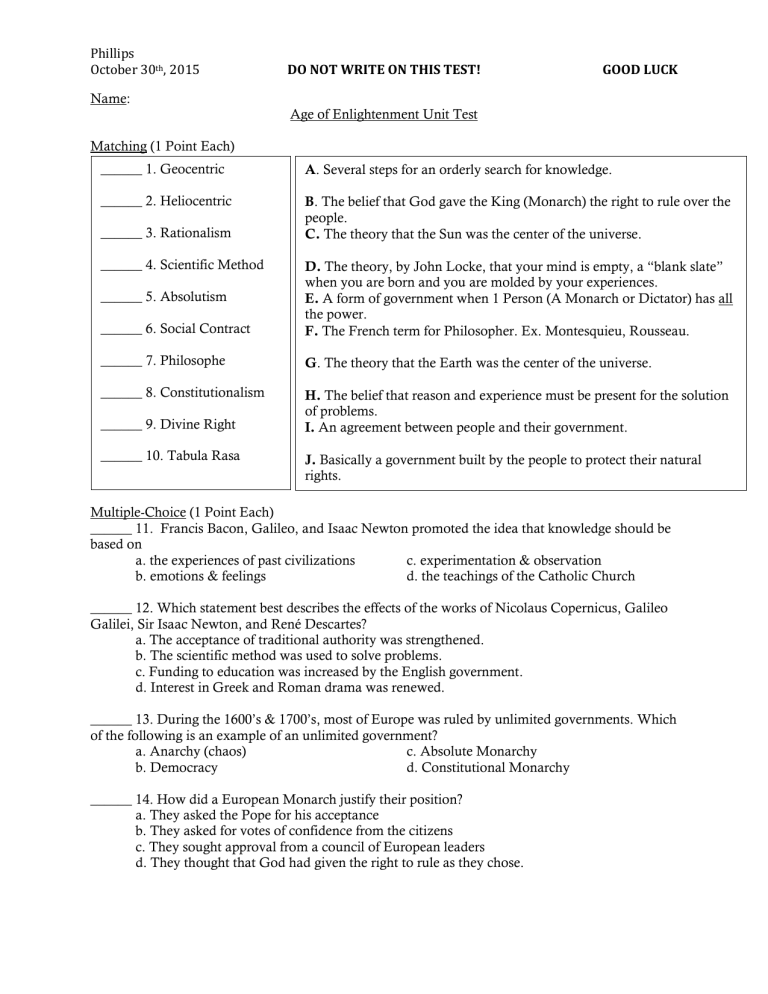
Phillips October 30th, 2015 DO NOT WRITE ON THIS TEST! GOOD LUCK Name: Age of Enlightenment Unit Test Matching (1 Point Each) ______ 1. Geocentric A. Several steps for an orderly search for knowledge. ______ 2. Heliocentric B. The belief that God gave the King (Monarch) the right to rule over the people. C. The theory that the Sun was the center of the universe. ______ 3. Rationalism ______ 4. Scientific Method ______ 6. Social Contract D. The theory, by John Locke, that your mind is empty, a “blank slate” when you are born and you are molded by your experiences. E. A form of government when 1 Person (A Monarch or Dictator) has all the power. F. The French term for Philosopher. Ex. Montesquieu, Rousseau. ______ 7. Philosophe G. The theory that the Earth was the center of the universe. ______ 8. Constitutionalism H. The belief that reason and experience must be present for the solution of problems. I. An agreement between people and their government. ______ 5. Absolutism ______ 9. Divine Right ______ 10. Tabula Rasa J. Basically a government built by the people to protect their natural rights. Multiple-Choice (1 Point Each) ______ 11. Francis Bacon, Galileo, and Isaac Newton promoted the idea that knowledge should be based on a. the experiences of past civilizations c. experimentation & observation b. emotions & feelings d. the teachings of the Catholic Church ______ 12. Which statement best describes the effects of the works of Nicolaus Copernicus, Galileo Galilei, Sir Isaac Newton, and René Descartes? a. The acceptance of traditional authority was strengthened. b. The scientific method was used to solve problems. c. Funding to education was increased by the English government. d. Interest in Greek and Roman drama was renewed. ______ 13. During the 1600’s & 1700’s, most of Europe was ruled by unlimited governments. Which of the following is an example of an unlimited government? a. Anarchy (chaos) c. Absolute Monarchy b. Democracy d. Constitutional Monarchy ______ 14. How did a European Monarch justify their position? a. They asked the Pope for his acceptance b. They asked for votes of confidence from the citizens c. They sought approval from a council of European leaders d. They thought that God had given the right to rule as they chose. Phillips October 30th, 2015 DO NOT WRITE ON THIS TEST! GOOD LUCK ______ 15. What is the ability of one branch of government to limit the power of the other branches called? a. A natural law c. A social contract b. executive privilege d. checks & balances ______ 16. Which of the following quotes would most likely be spoken by an absolute leader? a. “I am the state.” c. “I have no power to tell people what to do.” b. “I always choose democracy.” d. “I will do anything my people tell me to do.” ______ 17. What did John Locke believe that the rights of life, liberty, & property were? a. temporary rights c. rights guaranteed by the government b. rights won through battle d. natural rights ______ 18. Which of these best describes the function of a constitution? a. A promise of a King c. The natural laws made by God b. The Declaration of Independence d. The powers & limitations of government ______ 19. According to a social contract, where does a democratic government get its power? a. The courts c. The government b. The ruling political party d. the people ______ 20. During the Enlightenment, many philosophers relied on which of the following when making a decision? a. religion c. emotion b. the monarch d. reason (rationality) Matching Part II (1 Point Each) ______ 21. Hobbes P. She advocated for equality for women in the realm of politics & religion. ______ 22. Locke H. He was forced to sign the Magna Carta in 1215; thus limiting his power. ______ 23. Montesquieu i. He favored Freedom of Speech & Religion, and said church and state should be separate. LL. He helped compile information to create the first Encyclopedia. ______ 24. Rousseau ______ 25. Diderot ______ 29. Louis 14th I. Believed that a nation needed a proper justice system and completely against cruel & unusual punishment, and argued for fair & speedy trials. p. This King of France was the epitome of an absolute monarch because he was the center of France; hence the nickname “the Sun King.” S. He believed that people were born evil, wicked, & selfish and therefore needed an absolute monarch to keep them in check. 7. He believed that a government’s power should be separated into 3 branches to ensure that the government didn’t get to powerful. 0. He believed in a Social Contract between the people and their government. ______ 30. King John 9. He believed that people had the Natural Rights to Life, Liberty & Property. ______ 26. Voltaire ______ 27. Wollstonecraft ______ 28. Beccaria
